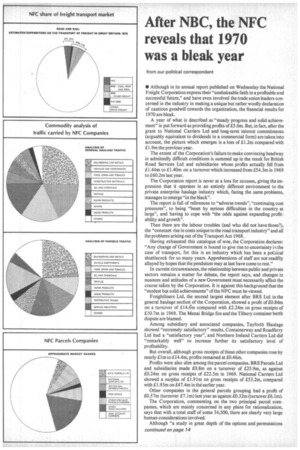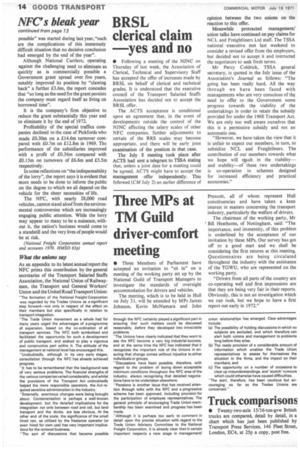After NBC, the NFC reveals that 1970 was a bleak year
Page 15

Page 16

If you've noticed an error in this article please click here to report it so we can fix it.
from our political correspondent • Although in its annual report published on Wednesday the National Freight Corporation express their "unshakeable faith in a profitable and successful future," and have even involved the trade union leaders concerned in the industry in making a unique but rather woolly declaration of cautious goodwill towards the organization, the financial results for 1970 are bleak.
A year of what is described as "steady progress and solid achievement" is put forward as providing profits of £5.6m. But, in fact, after the grant to National Carriers Ltd and long-term interest commitments (arguably equivalent to dividends in a commercial form) are taken into account, the picture which emerges is a loss of £1.2m compared with £1.9m the previous year.
The extent of the Corporation's failure to make convincing headway in admittedly difficult conditions is summed up in the result for British Road Services Ltd and subsidiaries whose profits actually fell from £1.44m to £1.40m on a turnover which increased from £54.3m in 1969 to £60.2m last year.
The Corporation report is never at a loss for excuses, giving the impression that it operates in an entirely different environment to the private enterprise haulage industry which, facing the same problems, manages to emerge "in the black".
The report is full of references to -adverse trends", "continuing cost pressures", to being "beset by serious difficulties in the country at large", and having to cope with "the odds against expanding profitability and growth".
Then there are the labour troubles (and who did not have those?), the "constant rise in costs unique to the road transport industry" and all the problems arising out of the Transport Act 1968.
Having exhausted this catalogue of woe, the Corporation declares: "Any change of Government is bound to give rise to uncertainty the case of transport, for this is an industry which has been a poLtical shuttlecock for so many years. Apprehensions of staff are not reactilly allayed by hopes that the pendulum may at last have come to rest."
In current circumstances, the relationship between public and private sectors remains a matter for debate, the report says, and changes in nuances and attitudes of a new Government must necessarily affect the course taken by the Corporation. It is against this background that the "modest but solid achievements" of the NFC must be viewed.
Freightliners Ltd, the second largest element after BRS Ltd in the general haulage section of the Corporation, showed a profit of £0.84m on a turnover of £14.em compared with £2.24m on gross receipts of £10.7m in 1969. The Menai Bridge fire and the Tilbury container berth dispute are blamed.
Among subsidiary and associated companies, Tayforth Haulage showed "extremely satisfactory" results, Containerway and Roadferry Ltd had a "satisfactory year", and Northern Ireland Carriers Ltd did -remarkably well" to increase further its satisfactory level of profitability.
But overall, although gross receipts of these other companies rose by nearly ilm to £14.4m, profits remained at £0.46m.
Profits were also slim among the parcel companies. BRS Parcels Ltd and subsidiaries made £0.8m on a turnover of £25.9m, as against £0.24m on gross receipts of £22.5m in 1969. National Carriers Ltd showed a surplus of £1.91m on gross receipts of £53.2m, compared with £1.93m on £47.4m in the earlier year.
Other companies in the general parcels grouping had a profit of £0.57m (turnover £7.1m) last year as against £0.32m (turnover £6.1m).
The Corporation, commenting on the two principal parcel companies, which are mainly concerned in any plans for rationalization, says that with a total staff of some 34,500, there are clearly very large human considerations involved.
Although "a study in great depth of the options and permutations possible" was started during last year, "such are the complications of this immensely difficult situation that no decisive conclusion had emerged by the end of the year".
Although National Carriers i operating against the challenging need to eliminate as quickly as is commercially possible a Government grant spread over five years, notably improved its position by "clawing back" a further £3.6m, the report concedes that "so long as the need for the grant persists the company must regard itself as living on borrowed time".
It is the company's firm objective to reduce the grant substantially this year and to eliminate it by the end of 1972.
Profitability of the special traffics companies declined in the case of Pickfords who made £0.30m on a £14.6m turnover compared with £0.7m on £12.8m in 1969. The performance of the subsidiaries improved with a profit of £0.36m compared with £0.15m on turnovers of £6.6m and £5.5m respectively.
In some reflections on "the indispensability of the lorry", the report says it is evident that more needs to be done to inform the public on the degree to which we all depend on the vehicle for the sheer necessities of life.
The NFC, with nearly 28,000 road vehicles, cannot stand aloof from the environmental controversies which are increasingly engaging public attention. While the lorry may appear to many to be a nuisance, without it, the nation's business would come to a standstill and the very lives of people would be at risk.
(National Freight Corporation annual report and accounts 1970. HMSO 65p)
What the unions say
As an appendix to its latest annual report the NFC prints this contribution by the general secretaries of the Transport Salaried Staffs Association, the National Union of Railwaymen, the Transport and General Workers' Union and the United Road Transport Union:
"The formation of the National Freight Corporation was regarded by the Trades Unions as a significant step forward—not only in respect of the effect on their members but also specifically in relation to transport integration.
"The Trade Union movement as a whole had for many years urged the advantages of a programme of expansion, based on the co-ordination of all transport services. The NFC both symbolised and facilitated the opportunity for such a development of public transport, and wished to play a vigorous and constructive part within it. The attitude of the management at national level has encouraged this. "Undoubtedly, although in its very early stages, consultation through the NFC has already achieved progress.
"It has to be remembered that the background was of very serious problems. The financial strengths of the various companies varied considerably, and whilst the provisions of the Transport Act undoubtedly helped the more responsible operators, the Act required sensitive administration in the industry,
"Externally, enormous changes were being brought about, Containerisation is perhaps a well-known development, but the detailed implications for the integration not only between road and rail, but land transport and the docks, are less obvious. At the other end of the scare, the significance of the small hired Van, as utilized by the freelance operator jor even hired for own use/ has very important implications for the removal business.
'The sort of discussions that became possible through the NFC certainly played a significant part in ensuring that such matters could be discussed reasonably, before they developed into intractable problems.
"The Unions have clearly indicated that they want to see the NFC become a very big industrial success, and at the same time the NFC has indicated that it recognizes the important role of the Unions in ensuring that change comes without injustice to either individuals or groups.
"Discussions have been possible, therefore, with regard to the problem of laying down acceptable minimum conditions throughout the NFC area of the industry, always recognising that detailed negotiations have to be undertaken elsewhere.
"Pensions is another issue that has received attention through talks with the NFC and a progressive scheme has been approved, including provision for the participation of employee representatives. The general principle of encouraging Trade Union membership has been examined and progress has been made.
"Although it is perhaps too early to comment in detail upon the precise situation with regard to the Trade Union Advisory Committee to the National Freight Corporation, it is already clear that in certain important respects a new stage in management/ union relationships has emerged. Clear advantages include: (a) The possibility of holding discussions in which no subjects are excluded, and which therefore can alert both unions and management to problems long before they arise, lb) The ready provision of a considerable amount of information which enables the Trade Uhion representatives to assess for themselves the situation in the firms, and the impact on their members, and Icl The opportunity on a number of occasions to clear up misunderstandings, and 'scotch' rumours which could otherwise have caused difficulties. "The start, therefore, has been cautious but encouraging so far as the Trades Unions are concerned."




























































































